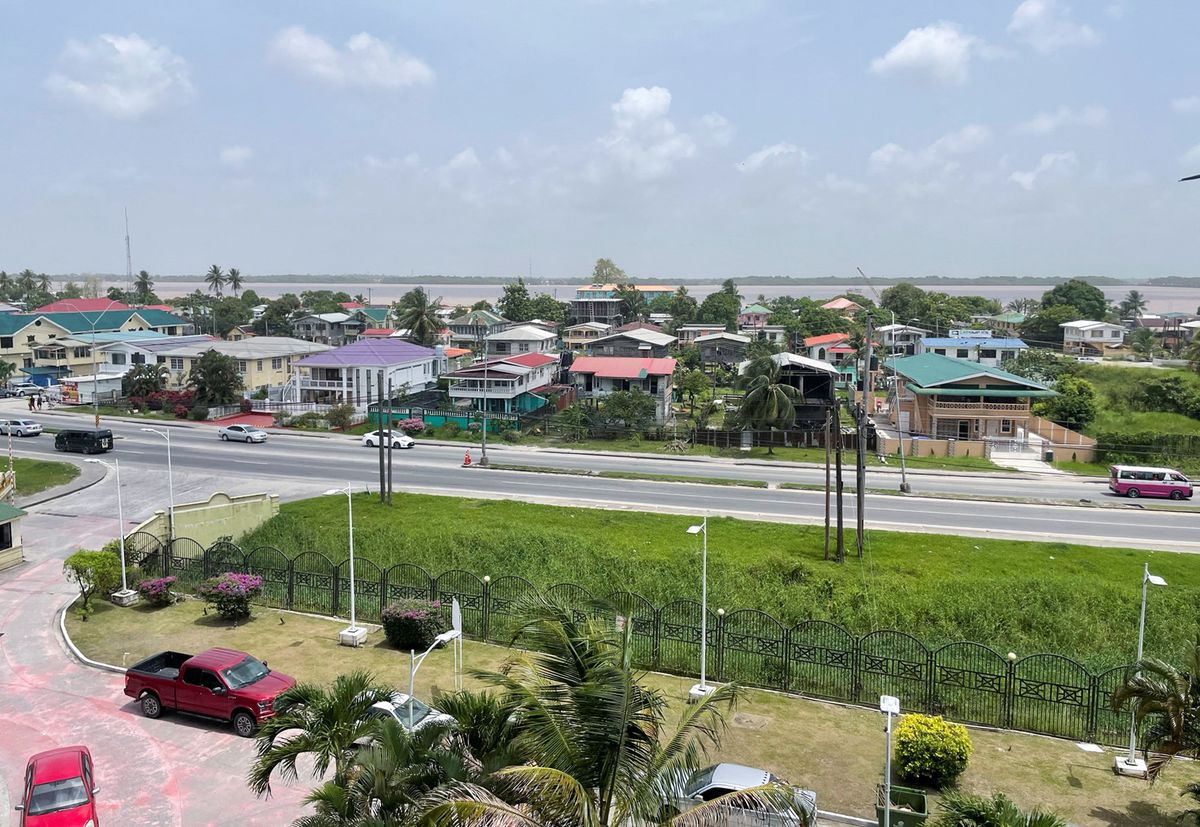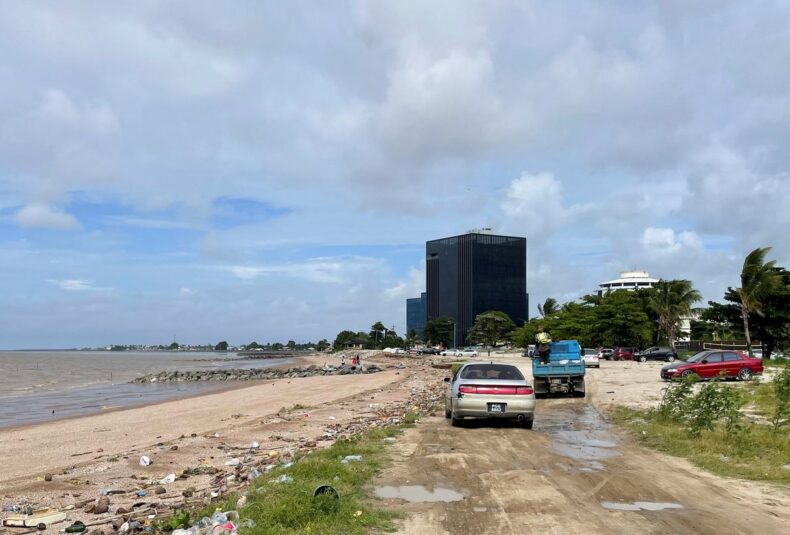By Harsha Josephine Antony | On Thurs 25 Aug 2022 | 8.20 pm IST |
Photo credit: Reuters

Since Exxon Mobil (XOM.N) discovered massive oil deposits off Guyana’s coastline in 2015, government leaders have pledged that “black gold” will transform the economy of one of South America’s poorest countries.
Government officials have promised that black gold will change the fortunes of one of South America‘s poorest nations ever since Exxon Mobil (XOM.N) discovered enormous oil deposits off Guyana’s coastline in 2015. The World Bank predicts that the economy will grow at the quickest rate this year alone, or 48%. The nation will be added to a lengthy list of petrostates whose people have stayed impoverished despite having abundant resource wealth, development experts and diplomats warn. However, if these funds are improperly managed, they will fuel Guyana’s racial politics, which are already intense.
Guyana’s government said in May that it had for the first time drawn money from the sovereign wealth fund that is used to hold the royalties paid by oil companies. The number of drawdowns by year’s end will be greater than $600 million and shortly reach billions. By 2027, Exxon plans to pump 1.2 million barrels daily from Guyana’s seafloor with its partners, New York-based Hess and China National Offshore Oil Corp (0883. HK), becoming Guyana the world’s largest producer per capita by a significant margin. Prepare for a substantial increase in government money with little knowledge of managing it, experts at the U.S. Agency for International Development advised in a report published earlier this year.
More than 30 politicians, business owners, activists, and regular individuals were interviewed for this study. The results revealed the high hopes and the deep worries of a country facing dramatic change. The present administration, backed mainly by Guyanese of East Indian heritage, claims that the oil boom would finance broad-based development with a focus on infrastructure and education for the country’s approximately 790,000 citizens. In an interview, Ashni Singh, Guyana’s finance minister, stated that the country’s commitment as a whole is to make sure that chances are present everywhere, regardless of where one lives or how they may have voted.
But many neighbourhoods remain dubious, especially those close to the Afro-Guyanese resistance. Some claim that money and contracts are already going to government supporters. They claim that the governing party appoints loyalists to the institutions tasked with overseeing the country’s newly discovered wealth. Guyana’s leaders strongly refute these claims. Aubrey Norton, a federal politician and leader of the opposition, claimed that the oil industry was attempting to exploit its power for political favouritism. The vision is absent.
A LARGE OPPORTUNITY WITH A COMPLEX TIMEFRAME
Guyana, sandwiched between Venezuela and Suriname, has a turbulent statecraft history partly because of rivalry between its major ethnic groupings. 30% of the population is made up of descendants of enslaved Africans. Another 40% of Guyanese are descended from Indian indentured labourers. The remaining population is primarily made up of persons of mixed race and indigenous people. Following a protracted political impasse following a contested election, President Irfaan Ali of the predominantly Indo-Guyanese People’s Progressive Party (PPP) took office in 2020.
A razor-thin, two-seat edge over the opposition, led by a coalition of parties made up primarily of Afro-Guyanese parties known as A Partnership for National Unity, has placed the PPP in the legislature in a position to make crucial decisions about the future of the country (APNU). The two sides have been at odds on every subject recently, from the importance of essential appointments to how the government’s expanding books should be examined. The Natural Resources Fund, the sovereign wealth fund holding Guyana’s oil royalties, has been the subject of arguably the most essential disagreement.
The fact that they have no authority to choose representatives for its board is one of the opposition’s complaints with the current legislation, which went into effect this year. They claim that in a nation with a history of pervasive corruption, this is cause for serious concern. The government dismisses these worries as unfounded. According to Singh, the finance minister, a plan under the previous APNU administration, which ruled from 2015 to 2020, would have further concentrated power in the hands of the ruling party. He asserted that the government’s selections for the board have impeccable credentials in any scenario.
The opposition responds by arguing that it is irrelevant. Any person deserves a seat at the table, regardless of their qualifications. Vincent Adams, a former environmental regulator whose appointment to the board by the opposition was rejected by the administration, stated that when everyone is from one side, it conveys one message: that the fund would become political.
BATTLE FOR FUNDS
Afro-Guyanese communities outside the National Assembly have occasionally protested in the streets against the government’s alleged unequal allocation of resources. In an interview, the head of the opposition, Norton, stated that the government’s liberal use of money handouts, which local bureaucrats frequently handle, encourages corruption and political favouritism. The government has repeatedly denied corruption and asserted that government audits are conducted on distribution programmes. The government has made a point of using inclusive language while speaking publicly. The struggle for resources, however, is frequently more nuanced than a conflict over money.
The previous administration terminated or decreased many state-owned sugar estates due to declining productivity. Most of the labourers on such estates are from the Indo-Guyanese community, who were outraged by this. The roles have started to flip since the government changed hands, and many Afro-Guyanese have protested that sugar-growing districts are receiving disproportionate investments. At the same time, their neighbourhoods are being neglected. According to its manager Yudhisthira Mana, the Uitvlugt Estate west of Georgetown lost hundreds of workers to other industries since the previous administration wouldn’t adjust salaries.
Government investment, though, has resurfaced over the past year. “I have never seen in my lifetime what is happening with sugar presently in terms of capital input,” said Mana, a 38-year industry veteran. He grinned as he recalled President Ali’s recent visit to his neighbouring residential residence. However, most people in Linden, a bauxite mining town with a sizeable Afro-Guyanese population, are cautious. The government has made significant investments, including a concerted effort to pave and repair the remote area’s poorly maintained roads. Many locals believe their district is receiving less funding than it is entitled to.
Charles Antigua, a former miner, remarked, “We’re in sorrow because it seems Linden isn’t benefiting like the rest of the country.” Most of the country’s leading businesspeople are Indo-Guyanese, which gives their ranks a significant edge in profiting directly from the rapidly expanding oil sector and adds to the feeling of inequity. In an interview, one of these businessmen, port developer Nazar Mohamed, claimed that President Ali had urged him to include an Afro-Guyanese investor in a Georgetown project, but few had the money. Ali’s office did not answer inquiries on the alleged request for comment. We did approach a few people, Mohamed said. However, they could not find the funding for the studies, let alone the project’s construction.













